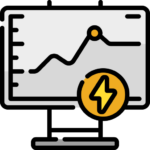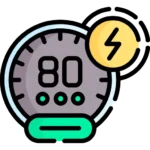EDF Business Energy
Compare deals with our business energy experts
Just enter your business postcode…
Compare deals with our business energy experts
Just enter your business postcode…
Start saving now
EDF Energy, one of the Big Six energy suppliers, provides business electricity and gas tariffs backed by renewable sources.
EDF’s renewable division is one of the largest solar, wind, and nuclear power developers in the UK, contributing to the country’s efforts to decarbonise the national grid.
This article offers an independent review of EDF, one of Britain’s best business energy suppliers. Here’s what we cover:
Here we outline the different ways to get in touch with the EDF Business Energy customer services team:

For EDF business energy customer service, call:
They are available Monday through Friday, 9 a.m. to 5 p.m.

EDF’s Business MyAccount allows you to pay invoices, submit meter readings, change or renew tariffs, and add another fuel type to your account.
Sign in to your EDF Business account from their login page.

To contact EDF Business Energy via email, use:
EDF Business Energy does not publish its fixed business electricity or commercial gas rates on its website.
To get a quote, you can contact them directly or use our business energy comparison service to obtain quotes from EDF and other suppliers.
Your business energy quote from EDF will depend on several factors, including your location, business electricity meter or business gas meter type, and annual business energy consumption.
Here are the energy tariffs available for small business energy customers with EDF.
EDF offers tailored quotes and additional energy procurement options for businesses with higher energy needs to meet their specific requirements.

EDF’s Fixed for Business tariff offers a fixed energy rate for a set contract term between 1 to 3 years. It provides budget certainty by protecting against market price changes, making it ideal for businesses seeking predictable energy costs.
It’s important to note that monthly payments must be made on time; otherwise, EDF reserves the right to transfer you to more expensive commercial gas or business electricity prices.

The EDF Fixed for Business Online tariff offers a fixed energy rate with an online discount. You must manage your account entirely online, including submitting meter readings and paying bills via Direct Debit.
A smart energy meter is required, and if it is not installed within three months, your contract will end, and you will switch to more expensive ‘Extended Supply’ prices. You can view the ‘extended supply’ prices by accessing their terms and conditions.

EDF’s Freedom for Business tariff offers flexibility. You can leave at any time without penalties, provided your account balance is clear.
The prices for this tariff are variable and can change, typically higher than those in fixed-price contracts. This higher cost reflects the uncertainty in energy purchasing, as EDF cannot buy your energy in advance.
This tariff is ideal for businesses seeking flexibility rather than long-term price stability.

EDF’s deemed tariff is the default option for customers who have moved into new premises but still need to set up a contract.
This tariff features variable pricing that can change anytime and is usually higher than fixed-term or standard variable rates.
Customers on this tariff compare business electricity rates and change to another supplier without incurring an exit fee.
Our business energy experts have summarised the important points of the EDF Business Energy Terms and Conditions, which form the business energy contract for small business customers.

EDF Business Energy provides several payment methods tailored to different business needs. These include Direct Debit for automatic monthly payments and options for one-time payments via bank transfer or credit/debit cards.
For those on a Fixed for Business Online tariff, payment by Direct Debit is mandatory.

You will be notified of your renewal options at the end of your contract with EDF Business Energy. These include an option to sign up for their ‘Easy Fix’ tariff, which includes a fixed rate for 12 months and the option to end at any time with no fees incurred.
If no action is taken, you will be automatically moved to EDF’s Extended Supply Prices, which will be considerably higher than your current rates. However, provided your account balance is clear, you can renew your contract, switch business energy tariffs, or move to another supplier without penalties.

EDF Business Energy may conduct credit checks when you apply for a new contract or tariff. These checks help assess your business’s financial stability and determine the appropriate payment terms.
Based on your credit score, EDF may require a security deposit or offer alternative payment arrangements. It’s important to be aware that credit checks are a standard part of the application process and can impact the terms of your contract.

EDF Business Energy offers a range of energy management tools to help businesses monitor and improve business energy efficiency.
These tools include online account management through ‘MyAccount’, where you can track energy consumption, set usage alerts, and analyse trends. EDF also provides smart meters for more accurate, real-time data, helping businesses identify opportunities for energy savings.
EDF Business Energy has a Trustpilot score of 4.5, based on reviews from both business and domestic customers. Our experts have filtered these to focus on business-specific feedback.
Pros for business:
Cons for business:
As a leading business electricity and commercial gas supplier, EDF is also a significant renewable energy generator in the UK.
EDF’s portfolio of renewable energy assets is used to supply its green business energy tariffs, which provide a zero-carbon business electricity supply.

EDF manages over 2 GW of UK wind farm capacity, encompassing both onshore and offshore wind farms, such as the Teesside Offshore Wind Farm. These projects utilise cutting-edge turbine technology and often include energy storage solutions to enhance grid stability and reliability.

EDF’s solar energy projects focus on large-scale farms that efficiently harness solar power to generate clean electricity. These farms often incorporate advanced technology and are sometimes paired with battery storage systems to enhance energy reliability and grid stability.

EDF invests in advanced battery storage technology to enhance grid stability and support renewable energy integration. These systems store excess energy from renewables and release it when needed, balancing supply and demand, improving grid efficiency, and ensuring a reliable energy supply.

EDF is a major player in nuclear energy, operating several nuclear power stations in the UK, including Sizewell B and Hinkley Point B. EDF’s nuclear plants contribute around 20% of the UK’s electricity. The ongoing construction of Hinkley Point C and the planned construction of Sizewell C will be the first new nuclear power stations in the UK in over 20 years.

EDF operates several UK gas power stations and gas storage facilities, providing a reliable backup source of electricity on windless days when renewable generation is low. These facilities earn BSUoS charges for balancing supply and demand on the national grid.
EDF is a vast organisation with extensive expertise, supported by specialist teams that offer additional services to large business energy customers.
Below are the key additional services offered by EDF Business Energy.

EDF offers an all-in-one service for installing new business electricity connections in commercial properties. EDF’s technical sales team can arrange the new connection process with your local Distribution Network Operator and set you up with a new supply contract.

EDF helps energy-intensive industries monitor their business energy consumption. Their metering team specialises in designing and implementing sub-metering solutions. EDF is also a licensed meter operator, so it can handle the installation and maintenance of half-hourly meters.

EDF supports businesses that generate their own electricity with commercial solar panels and other renewable sources. They offer Smart Export Guarantee tariffs, making exporting electricity to the grid easy. They also purchase electricity and REGOs for larger installations through Power Purchase Agreements.